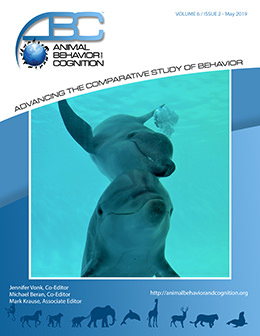Differential GO and NOGO Learning Within an Auditory Discrimination Task
Authors
Kusuma AnandPaul M. Nealen
Citation
Anand, K., & Nealen, P. M. (2019). Differential GO and NOGO learning within an auditory discrimination task. Animal Behavior and Cognition, 6(2), 141–157. https://doi.org/10.26451/abc.06.02.05.2019
Abstract
Animal discrimination training and testing often are used to assess animal behavioral flexibility and capabilities. GO-NOGO discrimination, in particular, has been used extensively, across a multitude of species and experimental paradigms. In its typical form, GO-NOGO discrimination learning is assessed by the magnitude of, and rate of acquisition of, discrimination capability, which is nominally low at the start of training, and through experience, is improved as a function of the reward schedule employed. Discrimination performance in this task is normally reported via a single empirical metric, as the percentage of stimulus-response trials which included a ‘correct’ response. However, this view of discrimination as a singular skill masks the considerable differences which exist in GO and NOGO responses (which typically require an action, and a suppression of action, respectively). To investigate the potential for these two responses to be learned independently and via different mechanisms, we performed operant training of adult zebra finches (Taeniopygia guttata) in a GO-NOGO auditory discrimination task. We demonstrate that correct responsiveness to GO and NOGO stimuli was learned via different overall performance trajectories, with performance on GO and NOGO trials emerging independently both within and between training sessions. We propose that this differential learning derives from a combination of response generalization and response modal form. These data suggest that response action and suppression are subserved by different neural circuits, and further indicate that consideration of discrimination tasks as univariate problems masks underlying complexity by obscuring their individual components.
Keywords
Auditory discrimination, GO-NOGO, Zebra finch, Operant, Learning

